

“In every walk with nature one
receives far more than he seeks.”
John Muir
“The Color of the Sky” by Chad Lawson:
“All of our discontents for what we want appear to me
to spring from want of thankfulness for what we have.”
“Robinson Crusoe”, Daniel Defoe
“Infinite Gratitude” by Lisbeth Scott:
DANIEL DEFOE
1660 – 1731
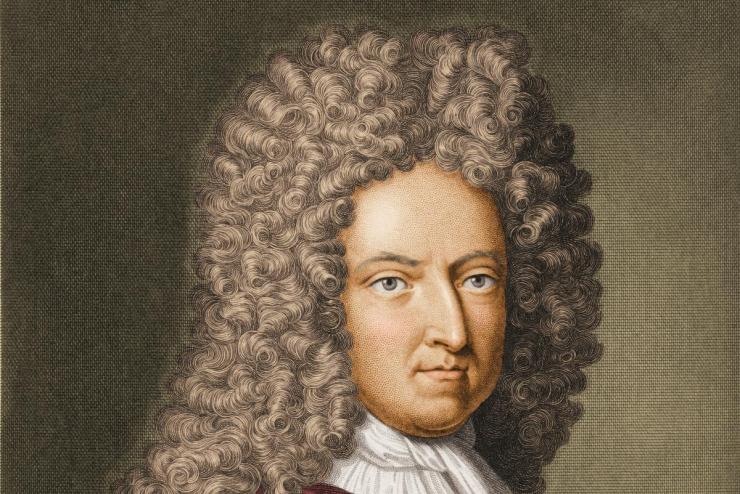
Courtesy of Course Hero:
Daniel Defoe was born in London, the son of a butcher. His father wanted him to become a minister (priest), but he preferred to go into a trade as a hosiery merchant, among other money-making schemes. He took part in Monmouth’s rebellion against James II in 1685, and while hiding in a churchyard he noticed the name, Robinson Crusoe carved on a gravestone and later gave it to his famous hero.

Defoe first achieved notoriety for a satirical pamphlet, The Shortest Way With the Dissenters (1702), which landed him in prison for seven months, but this failed to deter him from political writing. He had trouble finding a publisher for Robinson Crusoe (1719), but it was later to become his most famous work and is now claimed by many critics to be the first true novel.
The first edition of the novel

Moll Flanders (1722) and Roxana (1724) followed, and altogether he wrote an astonishing 560 works in his lifetime, including travel guides, journals, and many more inflammatory pamphlets. He died in 1731 at his lodgings in Ropemaker’s Alley in London’s Moorfields.
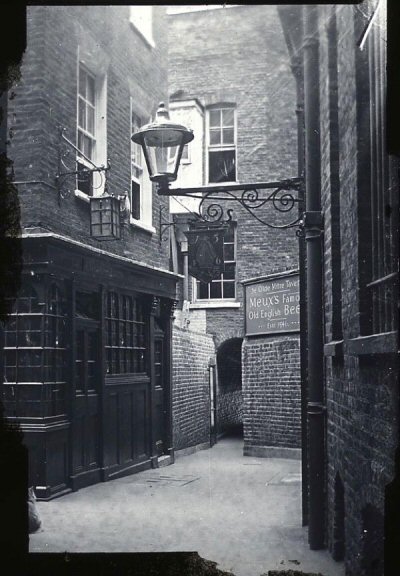
Defoe’s monument grave in London
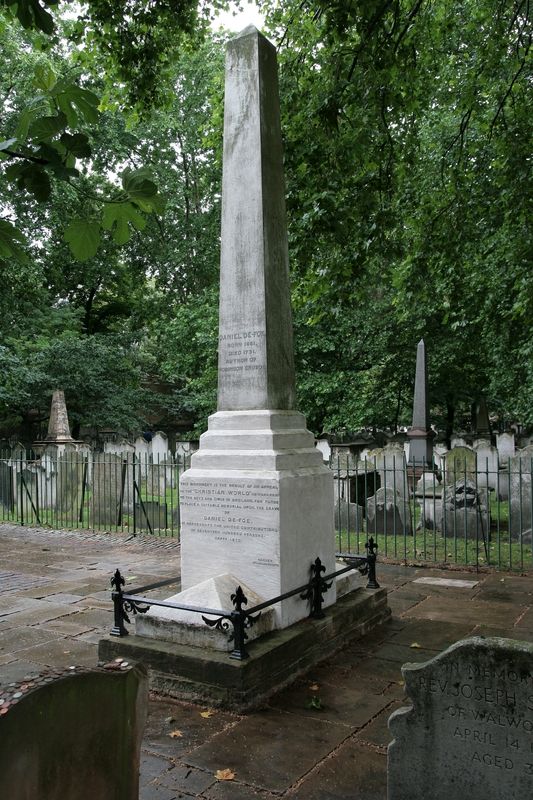

“Equinox: 1” by Oliver Davis, performed by Kerenza Peacock and Budapest Scoring Orchestra, conducted by Peter Illenyi:
ROBINSON CRUSOE

Courtesy of Oxford Academic:
In one of the world’s most famous stories, Robinson Crusoe is shipwrecked on an island somewhere in the Pacific and wrestles with loneliness and despair as he struggles to stay alive. With the ingenious use of some supplies and utensils salvaged from the ship, he manages to build a house and then a boat, and forage enough food to live on.

Should you ever need it, how to survive on a desert island (courtesy of How to Survive):
One day, years later, he finds a footprint in the sand and realises he is not as alone as he had thought.

The story is simple and compelling: against the advice of his father, a young man eschews the boring certainties of a comfortable life and runs off to sea in search of adventure. Despite misfortune on his first voyage, he persists in pursuing the promise of travel, until at last, he finds himself on a desert island, the sole survivor of a shipwreck.
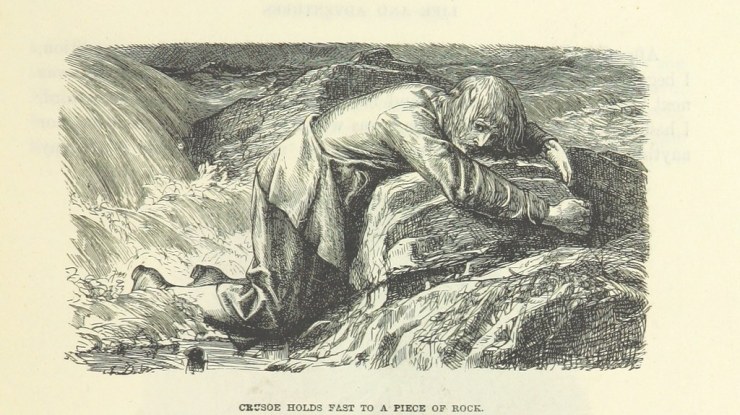
Crusoe overcomes his despair and applies himself to creating a home in his unfamiliar surroundings. For the next two decades, in solitude, he re-creates in his island wilderness as much as he can of the civilised world.

From the book’s opening sentence, Crusoe addresses, Crusoe addresses the reader in a voice – direct and declarative in a manner of casual speech, that was something new in literature. But it is only when Crusoe begins building his lonely habitat, narrating in matter-of-fact detail his projects and activities, that Defoe’s genius truly takes hold.

As Nobel Laureate J.M. Coetzee has observed, “For page after page – for the first time in the history of fiction – we see a minute ordered description of how things are done.” What Coetzee terms Defoe’s “pure writerly attentiveness” highlights what he describes with unexpected presence:
“By being a great artist and forgoing this and daring that in order to give effect to his prime quality, a sense of reality – Defoe comes, in the end, to make common actions dignified and common objects beautiful. To dig, to bake, to plant, to build – how serious these simple occupations are; hatchets, scissors, logs, axes – how beautiful these simple objects become. Unimpeded by comment, the story marches on with magnificent downright simplicity.”

And we march with it, until, like Crusoe, we are brought up short by a footprint on the beach:
“It happened one day about noon,” we read, “going towards my boat, I was exceedingly surprised with the print of a man’s naked foot on the shore, which was very plain to be seen in the sand.”
With this startling discovery, Defoe’s story opens out to welcome first “my man Friday,” whom Crusoe saves from cannibals, and then the victims of another shipwreck. By the time he is rescued himself after twenty-eight years, Robinson Crusoe can embark for England from the midst of a small community that has taken root in the long-lonely precinct of his ordeal.
But not before, alone on his island, he has cast a narrative spell that has enthralled readers for over three centuries. The book has had many film adaptations over the years.
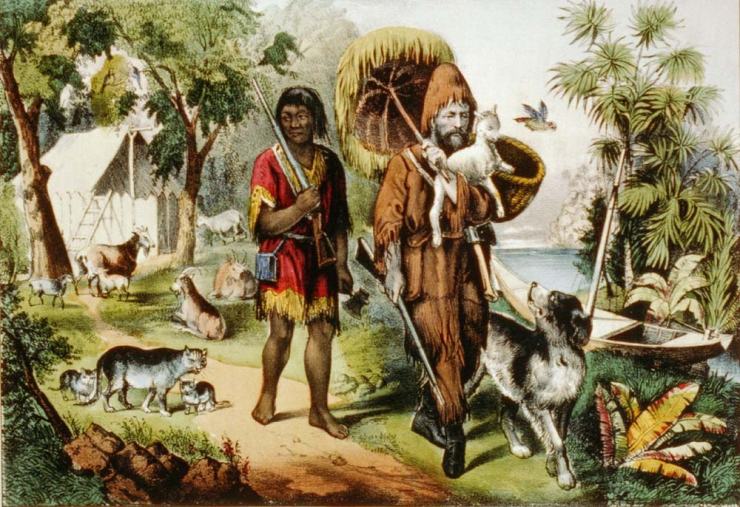
An extract from Robinson Crusoe:
“September 30, 1659. I, poor miserable Robinson Crusoe, being shipwrecked during a dreadful storm in the offing, came on shore on this dismal, unfortunate island, which I called ‘The Island of Despair; all the rest of the ship’s company being drowned, and myself almost dead.
All the rest of the day I spent in afflicting myself at the dismal circumstances I was brought to – vis. I had neither food, house, clothes, weapon, nor place to fly to; and in despair of any relief, saw nothing but death before me – either that I should be devoured by wild beast, murdered by savages, or starved to death for want of food. At the approach of night I slept in a tree, for fear of wild creatures; but slept soundly, though rained all night.

October 1. In the morning I saw, to my great surprise, the ship had floated with the high tide, and was driven on shore again much near the island; which, as it was some comfort, on one hand – for, seeing her set upright, and not broken to pieces, I hoped, if the wind abated, I might get on board, get some food and necessities out of her for my relief – so, on the other hand, it renewed my grief at the loss of my comrades, who, I imagined, if we had all stayed on board, might have saved the ship, or, at least, that they would not have been all drowned as they were; and that, had the men been saved, we might perhaps have built us a boat out of the ruins of the ship to have carried us to some other parts of the world.

I spent a great part of this day in perplexing myself on these things; but at length, seeing the ship almost dry, I went upon the sand as near as I could, and then swam on board. This day also continued raining, though with no wind at all.”
Statue of Alexander Selkirk in Fife, Scotland

Courtesy of Welcome to Fife:
Defoe based his novel on the true story of Alexander Selkirk (1676-1721), a Scottish sailor who was put ashore on the uninhabited South Pacific island of Juan Fernandez in 1704, and was marooned for four years there until 1709. His extraordinary first-person narrative is a convincing psychological study of an individual in extreme circumstances, and Defoe’s great talent is to make you feel as if you are there, experiencing it alongside Crusoe.

“These Memories” by Hollow Coves:
With his parrot and parasol, the castaway Crusoe is an emblem of survival, self-sufficiency, resourcefulness, and ingenuity that shapes civilisation from the raw materials of nature.

“By The Sleepy Lagoon” by Eric Coates (courtesy of Barry Hodgson):
PS As a child, I was so under the spell of this book that Crusoe’s method of working became mine for life.

Fascinating tale. I need to re-read it. Great job, Joanna.
LikeLiked by 1 person
I heartily agree with his quote about our “discontents”. It feels as if I have known the story of Robinson Crusoe all my life but I am not sure if I read it or was told it. There was always a romanticism about life on a desert island and the sea, sand and tropical breezes have much appeal but to survive alone I think you would need to be pretty tough. I knew there was a Selkirk Island, but I did not know the story of Alexander Selkirk. All very interesting. I love the video of Hollow Caves. What gorgeous scenery. And I love the Equinox 1 piece. Thank you Joanna!
LikeLiked by 1 person
I loved his novel A Journal Of The Plague Year. It’s about the bubonic plague that ravished London in the 1660s.
LikeLiked by 1 person
Thank you, Neil, for your interesting comment. Greatly appreciated.
Joanna
LikeLiked by 1 person
Thank you, Carolyn, for your lovely comments! Good to know that you read something new and you liked the music. Always greatly appreciated by me!
Joanna
LikeLike
Thank you, Pat, for making a start! I hope you will tell me more sometime.
Joanna
LikeLiked by 1 person
I’m glad that you’ve included this one Joanna, and you’ve covered it brilliantly, as you always do. I was almost there on that desert island while I was enjoying my morning cup of coffee.
Robinson Crusoe was also a childhood favourite of mine as was Treasure Island, both of which I’ve touched upon in my post Pirates, Slaves and Riots – Easymalc’s Wanderings.
You’ve included some lovely music and videos in this post Joanna and I can’t make up my mind which I like the best. Thank you for yet another wonderful post.
LikeLiked by 1 person
Thank you, Malc, for your wonderful comments!
Your reviews are always such uplifting, greatly appreciated words for me to read. Thank you!
Joanna
LikeLiked by 1 person
It is a very old joke
Robinson Crusoe was the only man who had all his work done by Friday. 😉
LikeLiked by 2 people
Thank you, Pat did not know that one
LikeLiked by 1 person
Wow, thank you for this incredible recommendation as well. I hadn’t realized that Robinson Crusoe was inspired by an actual person. Just amazing.
LikeLiked by 1 person
Thank you for your lovely comments! I love to find in other people’s post something new. Your words are greatly appreciated.
Joanna
LikeLiked by 1 person
Great post! It inspires me to read the original – I’ve only read an abridged version as a kid.
LikeLiked by 1 person
It must be everyones dream to live on a desert island. Mine, was somewhere in the middle of the Pacific, but I’d make do with something closer to home! Great post, Joanna 💝💓🌹🙋♂️
LikeLiked by 1 person
Thank you, Joanna for this interesting post about Daniel Defoe and his magnum opus, Robinson Crusoe. I walked down memory lane, when I had read about this adventure survival drama. I had also seen a movie thereon. It was interesting to know how he builds a house with the residual resources, how he discovers footprint on the shore and realises that he was not alone, and how he rescues a young native from cannibals.
Your posts have very well depicted his predicament, and excerpts are of quite help to understand the whole story. I liked the details given by you about Daniel Defoe, a son of a butcher. Despite a chequered history, he could write memorable books, though his satires and pamphlets put him in trouble too.
Thank you, Joanna, once again for Part-14. Your pictures and videos act as the icing on the cake. And yes, your P.S. defines what you are. Much appreciated!
LikeLiked by 1 person
Thank you, Kaushal, for your wonderful, as always, comments! You might recall, how I was planning on paper, in a way he would do, to build a farm in one of my posts. I even counted the bricks and started from the outside perimeter going towards the center. It proves that genius comes as a God-given gift irrespective of which family you came from
Thank you, Kaushal, for being such a loyal friend and you never miss my post!
Joanna
LikeLike
PS. My thought about being a genius was in reference to your comment that Defoe was a son of a butcher, and was not in any way connected to my humble efforts!
Joanna
LikeLiked by 1 person
Thank you, Ashley, for your poignant comments! I think a desert island needs two people to be acceptable, and you can create this even at your home.
Your praise, Dear Ashley, is always greatly appreciated.
Joanna
LikeLiked by 1 person
Thank you so much for the generous comment! Nothing can be more than lovely to hear that my post inspired you to read the original book. You will not regret it!
Joanna
LikeLiked by 1 person
Fantastic account Joanna. I have the unique experience of once having been on an island alone, apart from birds and animals.
LikeLiked by 2 people
Goodness, Peter, thank your for such an amazing comment!
You should write about it!
Joanna
LikeLiked by 1 person
I had planned to but am about 5 years behind at the moment!
LikeLike
I remember, Joanna, and that’s why I said, it reflects your personality. There is no question of missing your posts. Delay is possible, as I need enough time to digest the post. I’m also happy to be connected to you. Always welcome!
LikeLike
Oh yes, that’s okay, kudos to your humility! Thanks so much!
LikeLike
Thank you, again, Kaushal, greatly appreciated!
Joanna
LikeLike
You are more than welcome!
Joanna
LikeLike
I truly enjoyed this post Joanna and to learn the back story of Robinson Crusoe. I had no idea Daniel Defoe was the man behind the writings. Truly fascinating and I can see how you were under a spell as a child by this fascinating adventurous book. You bring such life to your stories and all of the music and videos bring life to an amazing time in history. Thank you for sharing it with us! 💗
LikeLiked by 1 person
Thank you, Cindy, for your wonderful comments! This is one of the books that stays with the reader forever, that is the reason why I included it in my series on the great books.
Thank you again, Cindy, your words are greatly appreciated.
Joanna
LikeLiked by 1 person
Ah, Joanna, where to? The Isle of Wight, Man or somewhere north and west off Scotland’s west coast? Perhaps Lindisfarne, in the north east?💌🙋♂️
LikeLike
I mean you can create your own island at your home, just two of you, in comfort, and not bother with cold and wind, especially in Scotland. It is more of a spiritual togetherness…
Joanna
LikeLiked by 2 people
A random question: does the Chop House still exist?
LikeLiked by 1 person
I don’t think so…
LikeLiked by 1 person
Okay, thank you. I will send an email 🙋♂️
LikeLiked by 1 person
You’e so welcome Joanna. And as it should be included. It is always a pleasure and I’m happy to hear . 💗
LikeLike
Thank you!
LikeLiked by 1 person
💕
LikeLike
I love that quote from John Muir and enjoyed learning about Defoe. Thanks for all your hard work and time, Joanna.
LikeLiked by 1 person
Thank you, Lauren, for your kind comments! I am glad that you like the latest post. Greatly appreciated.
Joanna
LikeLiked by 1 person
Joanna, we’re too cossetted, I suppose! Yes, it would have to be in the south and warmer. So, it’s the Isle of Wight. There’s bound to be a quiet corner there 🌹🍷🙋♂️
LikeLike
You are right, Ashley, we need somewhere warmer to be happy!
Joanna
LikeLiked by 1 person
Great post Joannna, thank you for sharing. I enjoyed the music too.
LikeLiked by 1 person
Awww, thank you again. ^_^
LikeLike
I never knew about this adventurer Joanna, thank you for bringing him alive. The only way I and many imagined and almost lived with was the character very well played by Tom Hanks in Cast Away. Its really hard and mighty to even think of having these days come upon anyone, and I am certain there ll be many tales buried in the depths of the seas of our world.
Also to learn about him being a son of a butcher subtly tells much about his inner will and curiosity.
Its like living on the edge every single moment and even to live by to tell the tale can only be a miracle that universe wanted this to come out. I loved the opening quote as much enjoyed the comments too.
I liked how this post brings together various artwork, sound and perception to become something a lot more. Thank you for writing about this Explorer, dearest Joanna.
Thanks again.
LikeLiked by 1 person
Thank you, Narayan, for your perceptive comments! You are right, there are many tales that were lost, sometimes rediscovered like the story of the Mary Rose, the ship brought back to the surfice after over 400 years at the bottom of the sea. As I wrote in my response to Kaushal’s comments, talent is God-given and where one came from is not important. I like your wise thought about the universe wanting the tale to be told. Perhaps, one day you will have a story of importance to tell.
Thank you again, Narayan, your words are greatly appreciated.
Joanna
LikeLike
Fascinating article, as usual! That ìs a wonderful book😘
LikeLiked by 1 person
Thank you, Luisa, greatly appreciated!
Joanna
LikeLiked by 1 person
You’re most welcome 🙏💙🙏
LikeLike
It’s always good to discover some of this books which will have a great impact on our lives.
Thanks for that ♥️
LikeLike
Thank you for your kind comment! Greatly appreciated!
Joanna
LikeLike
A wonderful story that makes us all stop and think… what would we do in that situation?
LikeLike